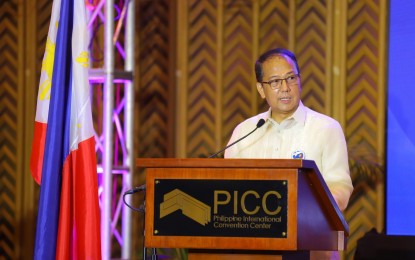
Presidential Adviser on the Peace, Reconciliation and Unity Secretary Carlito Galvez Jr. (Photo courtesy of OPAPRU)
MANILA – The newly transitioned Office of the Presidential Adviser on Peace, Reconciliation and Unity (OPAPRU) will further expand its mandate to sustain the legacy of President Rodrigo Roa Duterte in pursuit of the peace process in the country.
Secretary Carlito Galvez Jr., Presidential Adviser on the Peace, Reconciliation and Unity, on Thursday said the agency is determined to preserve the gains of the comprehensive Philippine peace process by helping former rebels and their families to transform into more "peaceful and productive members" of society.
By the virtue of an executive order (EO) 158, signed by President Rodrigo Roa Duterte on Dec. 27, 2021, reorganizing and renaming the Office of the Presidential Adviser on the Peace Process (OPAPP) to OPAPRU.
“With its new name and expanded mandate under EO 158, which was officially renamed and reorganized the OPAPP into OPAPRU, our organization is not only focused on fulfilling the national government’s commitments under all signed peace agreements but is also fostering reconciliation and unity among our people,” Galvez said in a news release.
OPAPRU also aims to turn “previously conflict-affected areas into show windows of peace and development.”
Galvez cited successful implementation of the peace processes with the Moro Islamic Liberation Front (MILF), Moro National Liberation Front (MILF), Cordillera Bodong Administration-Cordillera People's Liberation Army (CBA-CPLA), and the Rebolusyonaryong Partido Manggagawa-Pilipinas/Revolutionary Proletarian Army/Alex Boncayao Brigade-Tabara Paduano Group (RPM-P/RPA/ABB-TPG).
He, however, emphasized the need for OPAPRU to go beyond the signed peace agreements and find more innovative ways to sustain the gains achieved under these peace tables.
“All the peace negotiations have been completed and there is a need for the expanded development of the organization in order to execute and implement these signed agreements. During the State of the Nation Address (SONA) of the President, he committed that the signed peace agreements will be honored and implemented,” he said.
“And with that marching order, we saw our need to expand so that we can cover the building blocks of rehabilitation, and reconciliation, including the unification and harmonization of those communities affected by armed conflict,” Galvez added.
Galvez said the OPAPRU has three major objectives including embedding peace, reconciliation, and unity in the social fabric; enhancing resilience for peace; as well as pursuing social, economic, and political reengineering.
The then OPAPP allows the peace adviser to only advise the President in the management, direction, and supervision of the comprehensive peace process, while the Presidential Adviser on Peace, Reconciliation and Unity (PAPRU) is now tasked to manage, direct, integrate, and supervise, on behalf of the President, all aspects of the comprehensive peace process, including initiatives that promote and reinforce national reconciliation and unity.
The PAPRU shall also ensure that there will be greater convergence among different line agencies in the implementation of peace and development initiatives, which are anchored to a whole-of-nation, whole-of-society approach mandated under Executive Order No. 70.
“We change how we think as an organization and how we behave, and at the same time, look into the processes that we need to do -- from negotiation to mediation, towards rehabilitation and reconstruction and the building of reconciliatory avenues, and finally, the creation of harmonious relationships,” Galvez explained.
The peace adviser envisions the OPAPRU to become a “one-stop-shop” venue for synergizing and integrating the peace-building and development interventions of the various line agencies.
“We have the same concept with the Columbian government. We have eight-core agencies that will be working together so that we can achieve our objective of poverty in conflict-affected areas, raise the human development index, and strengthen peace and security efforts in communities,” Galvez said.
He pointed out that the OPAPRU’s mandated function is not a duplication to the operations of other line agencies, but further augmentation and complementation of services provided by the government.
As a member of the Cabinet’s Security, Justice, and Peace Coordinating Cluster (SJPCC) and the Inter-Cabinet Cluster Mechanism on Normalization (ICCMN), Galvez said the OPAPRU has able to support and help enhance the delivery of the peace-related programs of other member-agencies.
“The interventions of OPAPRU are not redundant because they are designed to be complementary and integrated with the initiatives of other agencies in consonance with EO 70, EO 79 and the SJPCC,” he said.
Galvez also underscored the need for the OPAPRU to integrate and harmonize the various initiatives carried out under the various peace tables.
“By doing this, all our interventions will support, complement and strengthen each other, and as a result, boost their impact on our nation’s peace, security and development, and improve the socio-economic well-being of our countrymen,” he said.
Galvez is also optimistic that the next administration will continue to implement the peace-building policies and initiatives have started by the Duterte administration.
“I am very confident that the next administration will prioritize the peace process and will be implementing the good legacy of the Duterte administration,” he said. (PNA)
